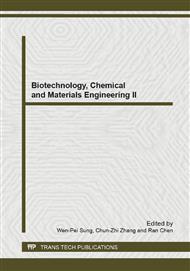p.725
p.732
p.736
p.740
p.744
p.748
p.752
p.756
p.760
Effect of Tumstatin T-7 Peptide on HepG-2 Cells and Human Umbilical Vein Endothelial Cells
Abstract:
The direct anti-tumor T-7 peptide of tumstatin was obtained to study its effect on human hepatoma cells (HepG-2) and human umbilical vein endothelial cells (ECV304). T-7 peptide was synthesized and its purity was up to 98.5%. MTT assay, growth curve, transmission electron microscopy(TEM) were used to detect the proliferation inhibition and pro-apoptotic function. MTT experiments and growth curve experiments showed that the survival of human hepatoma cells (HepG-2) decreased in a time- and dose-dependent way with the concentration of T-7 peptide increased. T-7 peptide can induce apoptosis of HepG-2 significantly. Apoptosis features were observed by TEM. However, the inhibition of T-7 peptide on human umbilical vein endothelial cells (ECV304) was weaker. Experiments showed thatT-7 peptide can affect HepG-2 cells. It had a certain therapeutic effect on human hepatocellular carcinoma. T-7 peptide have little effect on ECV304 cells, which means it didn’t influence the formation of tumor angiogenesis and normal cells
Info:
Periodical:
Pages:
744-747
Citation:
Online since:
January 2013
Authors:
Keywords:
Price:
Сopyright:
© 2013 Trans Tech Publications Ltd. All Rights Reserved
Share:
Citation:


